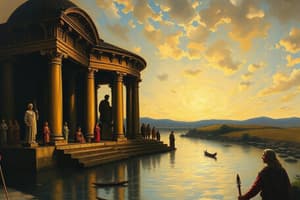Podcast
Questions and Answers
Where was Cyrus the Great born?
Where was Cyrus the Great born?
- Persia (correct)
- Asia Minor
- Media
- Babylon
Who ordered Harpagus to kill the newborn Cyrus?
Who ordered Harpagus to kill the newborn Cyrus?
- Mithridates
- Astyages (correct)
- Mandana
- Cyrus himself
What did Cyrus establish with a system of semi-autonomous provinces called satrapies?
What did Cyrus establish with a system of semi-autonomous provinces called satrapies?
- Achaemenid Empire (correct)
- Babylonian Empire
- Median Empire
- Immortals
What type of warriors were the Immortals?
What type of warriors were the Immortals?
Who deceived Lydian king Croesus with an oracle's answer?
Who deceived Lydian king Croesus with an oracle's answer?
In which battle did Cyrus defeat Croesus' army?
In which battle did Cyrus defeat Croesus' army?
What event led to Cyrus invading Babylon in 539 BC?
What event led to Cyrus invading Babylon in 539 BC?
What tactic did Cyrus use to enter Babylon, avoiding a full-scale assault?
What tactic did Cyrus use to enter Babylon, avoiding a full-scale assault?
What did Cyrus do upon entering Babylon in 539 BC?
What did Cyrus do upon entering Babylon in 539 BC?
According to Xenophon, how did Cyrus die?
According to Xenophon, how did Cyrus die?
What did Queen Tomyris do after defeating Cyrus?
What did Queen Tomyris do after defeating Cyrus?
What did Cyrus do after annexing Babylon?
What did Cyrus do after annexing Babylon?
How did Cyrus gain entry into Babylon?
How did Cyrus gain entry into Babylon?
What was the significance of Cyrus diverting the Euphrates River?
What was the significance of Cyrus diverting the Euphrates River?
What happened at the Battle of Opis?
What happened at the Battle of Opis?
What was Cyrus' approach towards taxes and public works in Babylon?
What was Cyrus' approach towards taxes and public works in Babylon?
Flashcards are hidden until you start studying
Study Notes
- Cyrus II, also known as Cyrus the Great, was the founder and first king of the Achaemenid Persian Empire in 600 BC.
- Born in Persis, a province of the Median Empire, Cyrus was the son of Mandana, whose pregnancy had been prophesied to flood all of Asia.
- Astyages, the Median king, ordered Harpagus to kill the newborn Cyrus but Harpagus instead secretly raised him as his own son with the help of Mithridates.
- During a game of "king and court" as a child, Cyrus whipped a noble boy, leading to his discovery by Astyages. Instead of punishing Cyrus, Astyages celebrated the act and raised him to be a cup bearer and advisor.
- Harpagus, who had been gathering anti-Astyages nobles, led a revolt against Astyages in 552 BC and Cyrus joined the uprising. They defeated Astyages' army and took control of Persia and Media.
- After the rebellion, Cyrus established the Achaemenid Empire with a system of semi-autonomous provinces called satrapies, governed by satraps and overseen by overseers. He also formed the Immortals, a notorious squad of 10,000 spear-wielding warriors.
- Cyrus made peace treaties with Babylon and Lydia but, deceived by an oracle's answer, Lydian king Croesus mobilized forces to attack Persia. Cyrus defeated Croesus' army in a battle and took Sardis, becoming the ruler of all of Asia Minor.
- Cyrus turned his attention to the Neo-Babylonian Empire, which was in disarray due to Nabonidus' poor rule. Cyrus dispatched his army to seize Elam and, posing as a liberator, invaded Babylon in 539 BC.
- Cyrus was welcomed as a savior by the Babylonian people and took control of the empire, restoring Marduk's supremacy in Babylon. He died shortly after, leaving behind a powerful Persian Empire.- Battle of Opis took place in last days of September near Opis.
- Cyrus' forces, under the Shahbaz standard, won a crushing victory against Nabonidus.
- Opis was plundered, Gubara surrendered and earned a place in Persian hierarchy.
- Nabonidus retreated to Babylon, preparing for a prolonged siege.
- Babylon had multiple layers of defence including two colossal walls, moats, and the Euphrates River.
- Cyrus arrived with his vast army and called for a council of war upon arrival.
- Decided against a full-scale assault due to potential massive casualties.
- Diverted the Euphrates River using a basin and palm trees, creating a new entry route into the city.
- Infiltrated the city via the diminished river, taking advantage of a festival.
- Cyrus entered Babylon on October 26th 539 to a rapturous welcome.
- Restored Marduk's priesthood, kept taxes low, and completed public works.
- Returned idols seized by Nabonidus and allowed him exile in Carmania.
- Ordered construction of Second Temple for Jews and became a Messiah in Jewish religion.
- Annexed Babylon's rich empire, with only Egypt remaining as a rival.
- Cyrus resided in Babylon for seven months of the year, visiting other cities during other seasons.
- Xenophon believed Cyrus died in bed, Ctesias believed he died from battle wounds, Herodotus told an epic tale of his death against the Massagetae led by Queen Tomyris.
- Tomyris offered Cyrus to withdraw or fight on her terms, and Cyrus crossed the river to engage her army.
- Tomyris' forces, known for their heavy bronze armour and brutal battle-axes, destroyed the Persian army.
- Cyrus was killed on the battlefield or from his wounds a few days later.
- Tomyris fulfilled her vow by giving Cyrus' head blood from an animal skin.
- Cyrus' remains came to rest at the Tomb of Cyrus in Pasargadae.
Studying That Suits You
Use AI to generate personalized quizzes and flashcards to suit your learning preferences.




